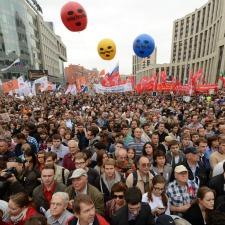BOB GARFIELD: This week jailed Russian punk band Pussy Riot was nominated for the European Parliament’s prestigious Sakharov Prize.
REPORTER: The man behind the nomination, Green MEP Werner Schulz, said, “These young women have shone a light on and protested against an autocratic system with courage, creativity and inner force. They have embarrassed the patriarchal power and they have exposed judicial arbitrariness.”
BOB: Also this week, Russia’s Lower House of Parliament voted to drastically expand the definition of high treason. Whereas before it was narrowly defined as assisting a foreign state in a way that jeopardizes Russia’s external security, it now includes any acts against, quote, “constitutional order, sovereignty and territorial and state integrity.” The change effectively makes activists and journalists who are critical of the government subject to the same harsh punishment formerly reserved for bona fide spies. Fred Weir of the Christian Science Monitor is a longtime Russia hand, based on Moscow. He says many of these changes seem to flow from the President Vladimir Putin.
FRED WEIR: Since he began his third term, back in May, there has been a raft of new legislation that makes it harder to engage in any kind of public protest, harder to use the Internet, harder to express yourself because of fear of the new defamation laws. Now, this new amendment which will really extend the definition of treason is really t he scariest thing to happen yet. It’s so vaguely worded that it’s hard to know who it wouldn’t apply to. Almost anyone who has dealings with foreigners now will have to think twice.
BOB GARFIELD: It sounds almost Soviet.
FRED WEIR: I was told today that the definitions in this law aren’t itself are far from the Soviet Criminal Code. It was all abolished in the 1990s and we got more the - a modern western-like law on espionage and treason and so on. So this is a reversion.
BOB GARFIELD: What can talking to an American-funded NGO earn a Russian who defies the law?
FRED WEIR: Twelve to twenty years in a penal colony, and you can apparently land in that position by giving some sort of unspecified assistance or help not only to a foreign government but to a foreign organization. This is one of the changes in the law. This is really about intimidating everybody, making them afraid to go out to public meetings, making them afraid to give their name to a foreign journalist, restoring that old Soviet paradigm of fear.
BOB GARFIELD: Who do you think Putin is most interesting in intimidating?
FRED WEIR: The authors of the NGO Law, which forces NGOs to self-identify as foreign agents told us, helpfully, which groups really angered them. And they were groups like Golos, a grassroots election-monitoring organization that actually fielded 50,000 observers in the Duma elections last December and laid the basis for the protest movement because they documented huge numbers of cases of ballot-stuffing and other forms of election fraud. And so, Golos definitely is a target. Transparency International, the Russian branch, which has done an awful lot of work in naming corrupt officials, is another one. And the two human rights groups, Memorial and the Moscow Helsinki Group, are clearly in the sights, as well. All of these organizations continue to receive a fair bit of foreign funding.
BOB GARFIELD: What about something like Radio Liberty, which is explicitly U.S.-government funded, what’s going on with them?
FRED WEIR: Radio Liberty announced last week that it’s closing its bureau here in Moscow, firing a lot of people, who are mainly Russians. And it will go into a multimedia but Web-based mode of broadcasting in future. Amendments to the Media Law make it illegal for any broadcasting outfit that’s more than half-owned by foreigners to operate in Russia. USAID was kicked out last week.
BOB GARFIELD: Now, USAID, the Agency for International Development, is probably guilty of funding projects that have some sort of western skew. But that doesn’t make them spies.
FRED WEIR: This is true. USAID does a lot of works that probably didn’t irritate the Russians, like medical aid, fighting human trafficking, helping the disabled. It did an awful lot of those kind of projects. But over a third of its funding went to human rights groups, organizations like Golos. Those are clearly the activities that led to USAID being kicked out.
BOB GARFIELD: At any point will Putin pay a penalty domestically as screws get tightened further and further?
FRED WEIR: I lived and worked for five years in the Soviet Union, and that was a well-oiled police state that kept astronauts [?] at arm’s length from the population. And all that went away, more or less. Two decades ago is a long time, and Russians are different now. And I do not see how that old paradigm can be restored.
BOB GARFIELD: You think there’ll be a show trial early to just get the message across to the Russian people?
FRED WEIR: Pussy Riot itself was something of a show trial, designed to chill the atmosphere. You can’t just put everybody back into that box. They’ve been out of it for two decades. And so, I can’t predict when and where or what it will be, but examples will have to be made so that people get it through their heads that this is how things are now.
BOB GARFIELD: All right Fred, thank you very much.
FRED WEIR: Thank you.
BOB GARFIELD: Fred Weir is the Moscow correspondent for the Christian Science Monitor.

